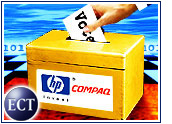
It has now been more than a year since Hewlett-Packard and Compaq merged. It’s been nearly two years since the idea of the deal was made public.
Neither time frame is particularly long in the grand scheme of things, but for impatient observers, it’s a lifetime. People want to know right now whether the merger was worth it. Was Carly Fiorina right? Or did the opposition forces lose the battle only to see the army fall into ruins?
The answers so far have been mainly in the “mostly good” category or of the ever-dreaded “too soon to tell” and “wait and see” sort.
Wait and see? Haven’t we already done that?
Dash of Cash
Granted, a US$19 billion merger shouldn’t be an easy thing. It shouldn’t be a quick thing. Taking two of the world’s biggest technology companies and merging them into one ought to be a gargantuan challenge, and it ought not be rushed into or glossed over.
But this is America, and we demand closure. We want things wrapped up in a neat package, tied with a bow. And we want to know whether things are good or bad. We don’t like mixed results or unfinished business.
Nevertheless, a year after the HP-Compaq merger, that is what we have. A work in progress. A half-baked cake.
Turning Up the Heat
HP apparently knows people can only take so much talk and hear so many promises about what sowing the merger seeds will reap one day. On the anniversary, HP came out with an initiative aimed at getting more bang for its 19 billion bucks by targeting big corporations.
The company also has been quick to shine the spotlight on its scores of customer wins since the merger. Whether or not each one would have been possible without Compaq on board is hard to say and really beside the point. Details are not what’s important. Results are what matter.
HP gets that, probably because Fiorina understands it so clearly. The new-business initiative was, in some ways, the first effort by the newly combined company to say the merger was under control, if not a done deal. The rest of the details, she seemed to be saying, are the type you don’t want to bore yourself with, so just take our word for it that we’ve integrated Compaq.
Tick Tock
However, everyone knows it’s going to take more time for that to truly happen. Even if the companies were fully merged physically, it definitely would take more than a year to blend two corporate cultures that, by some accounts, are vastly different.
Besides, if it were a done deal, we’d get some definitive answers about the success or failure of the merger from sources that aren’t HP itself.
Instead, we know only a few things, one being that the merger probably wasn’t the colossal mistake the opposition painted it as. We also know that Fiorina is still standing and that business history books will probably paint her as a heroic figure for surviving the legal warfare and not losing focus on the task at hand.
No Closure Here
We probably also have to come to grips with another fact: There likely will never be full consensus about whether or not the merger was a no-questions-asked success.
How will we move on without that closure? The courtroom drama, the accusations, the proxy voting, all ends with a fade to black, a to-be-continued? Come on. Even TV reality shows have follow-ups to show us how things turned out.
I guess reality isn’t so neat and tidy after all. And that’s just not fair.
Note: The opinions expressed by our columnists are their own and do not necessarily reflect the views of the E-Commerce Times or its management.


























































Just a quick comment on one piece of your article. Towards the end, you write:
"Even if the companies were fully merged physically, it definitely would take more than a year to blend two corporate cultures that, by some accounts, are vastly different."
As it turns out, there were (are) really _three_ major cultures that had to come together as part of this merger: HP, Compaq, and Digital. As in DEC, Digital Equipment Corp. The vast majority of the people working in Compaq sites in New England were Digital employees.
While Compaq’s PC-centric commodity product culture may have been the rule in Houston, in the facilities up here, many of us carried (and still do carry) the Digital "Do The Right Thing" ethos, as well as the belief that R & D is the key to innovation and great products. This is very close in spirit to the "HP Way", and consequently it has helped a great deal in our dealings with our R & D counterparts in California, Colorado, and elsewhere in HP.
In some respects, it’s been downright refreshing to once again be part of a company where research and development — "engineering" in old-timer DECspeak — is a highly valued major centerpiece of what we do, rather than being a poorly-understood appendage.
And it even shows right down to the new logo:
"HP – invent".
You can’t invent without R & D.
So while some parts of Compaq may be a bit difficult to digest, the parts derived from the old Digital are, in my opinion, well on their way to becoming part of the muscle and sinew of the new HP.